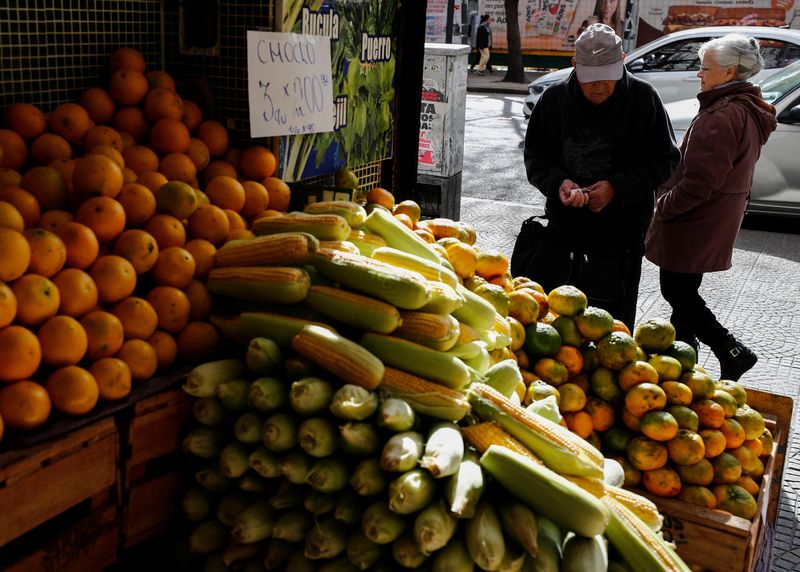By Miguel Lo Bianco and Hernan Nessi
BUENOS AIRES (Reuters) -Argentina's annual inflation rate soared to 109% in April, the country's statistics agency said on Friday, smashing past analyst forecasts and stoking anger among hard-hit consumers who are increasingly having to skimp and save to get by.
The South American nation, an important grains exporter and the region's no. 2 economy, posted 8.4% monthly inflation in April, well above analyst forecasts of 7.5% and the highest in decades. That took the 12-month rate to an eye-watering 108.8%.
The price spike has pushed one in four people into poverty in a country that has battled for decades with high inflation, along with cyclical debt and currency crises. Dwindling central bank reserves are now imperiling the government's finances.
"They've turned us into a country of beggars," Carlos Andrada, a 60-year-old self-employed worker, told Reuters as he searched for cut-price deals at a vegetable stall at a market in the suburbs of capital city Buenos Aires.
"One despairs because after working all your life, you have to fight just to get a tomato or a bell pepper," he said.
The highest analyst estimate in a Reuters poll for April's monthly inflation rate had been 8.3%. "The data exceeded all forecasts," said economist Daniel Artana from consultancy FIEL.
Argentina's fragile economic situation has been aggravated by a historic drought since last year, which has hammered soybeans, corn and wheat exports, draining foreign reserves and hindering the government's ability to fight currency weakness.
Volatility in the foreign exchange market, which saw the peso hit record lows near 500 to the dollar in parallel markets last month, has inflamed prices further and strained Argentina's huge $44 billion loan deal with the International Monetary Fund.
"When I came last time (to the market), I paid 300 pesos a kilo for bell peppers - it's 300 pesos a half kilo now," said Olivia Maria Belbruno, 70, a retiree.
"These are the governments we have and we, the citizens, must think because we are the ones who give them our votes."
The Peronist ruling coalition is battling to bring prices down ahead of August primary elections and a general ballot in October.

"I've stopped going out to eat once a month, we haven't been on vacation anywhere for four years, we had to sell the car because we couldn't pay insurance, licenses and garage costs," said graphic worker Salvador Paterno, 64.
"We use little air conditioning, heating. Everyone cuts back on these habits to make ends meet - if you even make it at all."